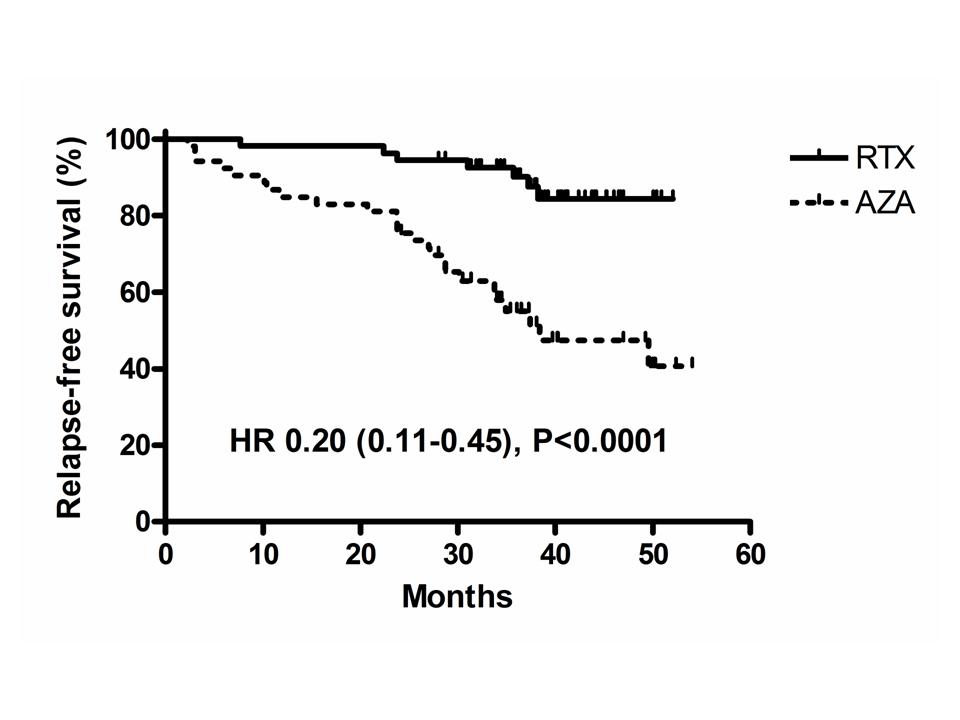Rituximab Versus Azathioprine for Maintenance in Antineutrophil Cytoplasmic Antibodies-Associated Vasculitis: Follow up at 39 months.
Background/Purpose: Rituximab was shown to be as effective as cyclophosphamide to induce remission in patients with ANCA-associated vasculitis (AAV). The prospective, randomized, controlled MAINRITSAN trial compared rituximab (RTX) to azathioprine (AZA) to maintain ANCA-associated vasculitis (AAV) remission. Once remission was obtained with a conventional regimen using corticosteroids and cyclophosphamide, patients were randomly assigned to receive a 500-mg RTX infusion on D1, D15, 5.5 months later, then every 6 months for a total of 5 infusions over 18 months, or AZA for 22 months at the initial dose of 2 mg/kg/d. The primary endpoint was the major relapse rate (EULAR/ACR criteria) at 28 months. This study demonstrated that 500 mg of rituximab (RTX) every 6 months was superior to azathioprine (AZA) to maintain ANCA-associated vasculitis (AAV) remission during the 28-month follow-up, with a similar profile of tolerance. This study describes the extended follow-up of patients included in the MAINRITSAN trial.
Methods: Extended follow-up was ascertained from the patients included in the trial. Data on relapse and survival were collected from physician records. All patients were analyzed according to the group to which they were randomized, except for 8 patients who were excluded from the extended follow-up because of severe violation to protocol.
Results: One hundred and nine patients were analyzed for the extension of follow-up. Median duration of follow-up was 38.6 months (IQR, 33.5-45.2 months). Seven out of 55 (12.7%) patients in the RTX arm and 26/54 (48.1%) patients in the AZA arm had at least one major relapse. Overall, the risk of major relapse remained significantly lower in the RTX arm compared to the AZA arm (hazard ratio 0.20, 95% CI 0.11 to 0.45, P<0.0001). During follow-up, 3 patients died in the AZA arm but none in the RTX arm. Causes of death were infection, cancer and mesenteric ischemia. Overall survival rate was better in the RTX arm compared to the AZA arm (P=0.07).
Conclusion: Despite relapses in the RTX arm after the end of the study period, RTX remains associated with a lower risk of relapse than AZA. RTX tends to be associated with a better overall survival compared to AZA.
Disclosure:
B. Terrier,
None;
C. Pagnoux,
None;
A. Karras,
None;
C. Khouatra,
None;
O. Aumaître,
None;
P. Cohen,
None;
F. Maurier,
None;
O. Decaux,
None;
H. Desmurs-Clavel,
None;
P. Gobert,
None;
T. Quemeneur,
None;
C. Blanchard-Delaunay,
None;
P. Godmer,
None;
X. Puéchal,
None;
L. Mouthon,
None;
L. Guillevin,
None.
« Back to 2013 ACR/ARHP Annual Meeting
ACR Meeting Abstracts - https://acrabstracts.org/abstract/rituximab-versus-azathioprine-for-maintenance-in-antineutrophil-cytoplasmic-antibodies-associated-vasculitis-follow-up-at-39-months/

